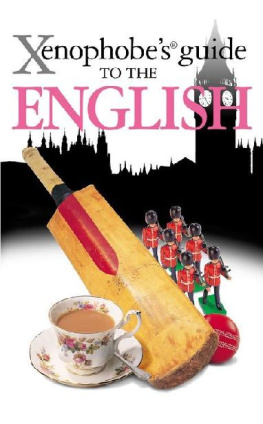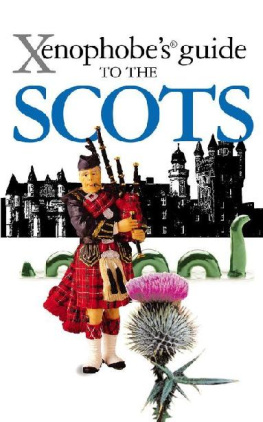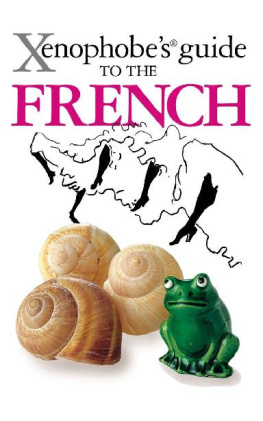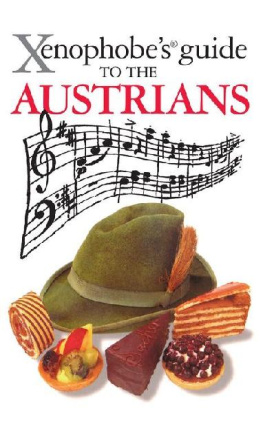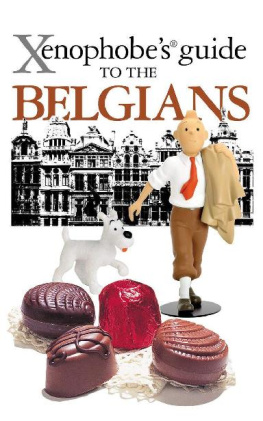Antony Miall - The Xenophobes Guide to the English
Here you can read online Antony Miall - The Xenophobes Guide to the English full text of the book (entire story) in english for free. Download pdf and epub, get meaning, cover and reviews about this ebook. City: London, year: 2008, publisher: Oval Projects, genre: Religion. Description of the work, (preface) as well as reviews are available. Best literature library LitArk.com created for fans of good reading and offers a wide selection of genres:
Romance novel
Science fiction
Adventure
Detective
Science
History
Home and family
Prose
Art
Politics
Computer
Non-fiction
Religion
Business
Children
Humor
Choose a favorite category and find really read worthwhile books. Enjoy immersion in the world of imagination, feel the emotions of the characters or learn something new for yourself, make an fascinating discovery.
- Book:The Xenophobes Guide to the English
- Author:
- Publisher:Oval Projects
- Genre:
- Year:2008
- City:London
- Rating:4 / 5
- Favourites:Add to favourites
- Your mark:
- 80
- 1
- 2
- 3
- 4
- 5
The Xenophobes Guide to the English: summary, description and annotation
We offer to read an annotation, description, summary or preface (depends on what the author of the book "The Xenophobes Guide to the English" wrote himself). If you haven't found the necessary information about the book — write in the comments, we will try to find it.
The Xenophobes Guide to the English — read online for free the complete book (whole text) full work
Below is the text of the book, divided by pages. System saving the place of the last page read, allows you to conveniently read the book "The Xenophobes Guide to the English" online for free, without having to search again every time where you left off. Put a bookmark, and you can go to the page where you finished reading at any time.
Font size:
Interval:
Bookmark:


The English have an instinctive distrust of the unfamiliar and nowhere is this more clearly seen than in their attitude to the geography of their own country.
The English population is 52 million compared with 3 million Welsh, 5 million Irish (North and South combined), 4 million Kiwis, 5 million Scots, 20 million Aussies, 64 million French, 82 million Germans, 149 million Russians and around 307 million Americans.
England is five times larger than Sicily, but could fit into France five times.
The attitude of the English towards other nations is not so much xenophobia (fear of foreigners) as xenopili (pity for foreigners for having the misfortune to be, well, NOT English). As Cecil Rhodes (who gave his name to Rhodesia todays Zimbabwe) once observed: To be born English is to win first prize in the lottery of life. It is hardly surprising, then, that the English should feel a bit sorry for all the runners-up.
To be born English is to win first prize in the lottery of life.
The last invasion of England was perpetrated 900 years ago by the Normans. They settled, they worked hard, they tried to integrate and fit in, they tried to share their wisdom and experience with the locals. They failed. The English did what they do best. They ignored the funny cooking smells, the unfamiliar clothes and peculiar accents and set about the long, slow, arduous task of turning the invaders into Englishmen. It took centuries of course, but it worked. Norman is no longer a name redolent of invasion and locking up ones daughters: it is a quintessentially English first name.
The Venetian Ambassador, Andreas Trevisano, visiting London in 1497 made the following observation about the English:
They do not believe that there are any other people than themselves, or any other world than England: and whenever they see some handsome foreigner, they say, He looks like an Englishman, or, What a pity he is not English.
These days the English are not as unanimous in this view as they once were, some regarding England as a place to escape from at every opportunity, but the majority remain innately mistrustful of abroad dodgy food, dodgy water, dodgy plumbing, and, worst of all, dodgy foreigners.
The majority of the English remain innately mistrustful of abroad dodgy food, dodgy water, dodgy plumbing, and, worst of all, dodgy foreigners.
Geography reinforces this belief as the inhabitants look out to the sea all around them from the fastness of their tight little island. Nobody would ever question the aptness of the newspaper headline: Fog in the Channel Continent cut off.
This insular mind-set is what you are up against. It is useless to imagine that you can succeed in penetrating it when so many have failed. But since the English take a perverse pride in acknowledging a total lack of understanding of foreigners, it would be gratifying to gain a tactical advantage by understanding them.
The English see themselves as law abiding, courteous , tolerant, decent, generous, gallant, steadfast and fair. They also take pride in their self-deprecatory sense of humour which they see as the ultimate proof of their good nature.
In a perfect world, the English suspect that everyone would like to be more like them.
Though they put themselves down in public, in their heart of hearts they believe the English to be superior to all other nations, and are convinced that all other nations secretly know that they are. In a perfect world, the English suspect that everyone would like to be more like them.
The English are convinced that the best things in life originate in England or have been improved there. Even their weather, though it may not be pleasant, is far more interesting than anyone elses, and is always full of surprises.
They are also convinced, with some justification, that no-one really understands them. In the words of one of their much loved song-writers, Michael Flanders:
The English are moral, the English are good,
And clever, and modest, and misunderstood.
This claim to be misunderstood is not to be seen as a plea for understanding. They do not want to be understood such intimacy would be an invasion of their privacy.
They are used to being seen as stereotypes and prefer it that way.
The English are dimly aware of foreign criticism but feel it should not be taken too seriously. They are used to being seen as stereotypes and prefer it that way: they dont mind in the least that England is seen as peopled by bowler-hatted city types, football hooligans, silly-ass nobility and cheeky cockneys, all meeting at an ancient pub for a pint of warm beer.
Mostly they are seen as a relic of the glory days of the past when they were major players in the European sport of empire building.
They are also perceived as hidebound, prejudiced and unco-operative a people who live in a land of costume dramas, shrouded in grey skies, sustained by deep fried sausages.
Foreign residents come to respect the English for their refusal to make a fuss and their adherence to personal principles, but remain forever bewildered by their uncomplaining attitude towards the shoddy and the second-rate, and see their concern with manners as a substitute for personal style. The emphasis on table etiquette alone is a mystery in a country of people who are more than a little challenged in matters culinary.
Foreigners are expected to understand that if an Englishman hasnt kept his word, there is a very good reason for it.
The English pride themselves on their sense of fair play, and rather assume that it is recognised and generally admired by all. They would like to be loved and appreciated for what they see as their sterling qualities. These attributes, which they bring selflessly to the world forum, include a reflex action which leads them to champion the underdog and treat persecutors with a firm hand, truthfulness , and a commitment never to break a promise or to go back on their word. Foreigners are expected to understand that if an Englishman hasnt kept his word, there is a very good reason for it.
If possible, try to find it in your heart to be charitable about these and other beliefs, even if you believe them to be delusions. Aside from anything else, the moment you disagree with their vision of themselves, most English will take your side and agree with you. Respect for the underdog, you see.
Nowhere is the English peoples instinctive distrust of the unfamiliar more clearly seen than in their attitude to the denizens of their own country.
When it comes to their neighbours in the British Isles, the English are in absolutely no doubt as to their own predominance.
Since time immemorial there has been a North-South divide in England. To the Southerner, civilization ends somewhere around the Watford Gap (just north of London). Beyond that point, he believes, the inhabitants are all ruddier in complexion , more hairy, blunt to the point of rudeness, and obsessed with stew all of which he generously puts down to the cooler climate.
In the North they caution their children with tales of the deviousness of the inhabitants down South. They point to their softness, their fussy food and their airy-fairiness on all matters of importance.
Font size:
Interval:
Bookmark:
Similar books «The Xenophobes Guide to the English»
Look at similar books to The Xenophobes Guide to the English. We have selected literature similar in name and meaning in the hope of providing readers with more options to find new, interesting, not yet read works.
Discussion, reviews of the book The Xenophobes Guide to the English and just readers' own opinions. Leave your comments, write what you think about the work, its meaning or the main characters. Specify what exactly you liked and what you didn't like, and why you think so.

